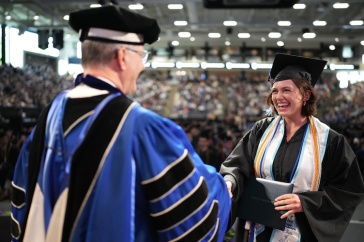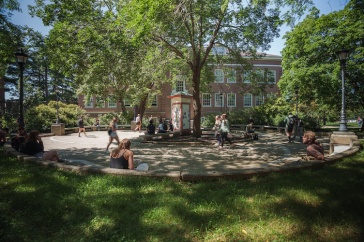
The first career Molly Comrie ‘19 considered was physical therapy. She was in high school, and something made her think it would be a good fit. But then she couldn’t put her finger on what that was, exactly, and started to have doubts. Fortunately, she had a teacher who offered some insight.
“I’d always been a people person, and she told me she thought social work would be a great choice for me,” Comrie says. “We talked about it, and I thought she might be right. I didn’t know there was actually a job where I could just be me.”
"It’s so exciting now to think I’ll have my master’s degree by the time I’m 23.”
So, she took her teacher’s advice, came into UNH with her major declared and started right in that first year taking classes in social work. And that cinched it. “When I took an introduction to social work class and learned all the things you could do in the field, I knew I was where I should be,” Comrie says.
During the last four years, that certainty has only grown stronger; she graduates May 18 with a bachelor’s degree in social work. Two days later, Comrie begins UNH’s master of social work (MSW) program.
Last year, Comrie was exploring job possibilities in her major for people who had bachelor’s degrees. One area that interested her was working in a hospital supporting patients, but she knew she would have to work her way up to that kind of position. And she took notice of how often she came across references to an MSW.
“That’s when I started thinking about staying on for my master’s,” the Andover, New Hampshire, resident says. “I knew it would make a difference in where I’d end up. It’s so exciting now to think I’ll have my master’s degree by the time I’m 23.”
Clinical assistant professor of social work Will Lusenhop suggested Comrie apply for a grant he helped secure in 2017 from the Health Resources Services Administration that awarded UNH $1.9 million to put master’s-level social workers and occupational therapists to work in primary care settings that integrate behavioral healthcare. She applied and got it.
“I had applied to graduate school already, but the grant and the amazing professors I have had as an undergraduate were my push to stay at UNH for this program,” Comrie says. “The encouragement I’ve received has been fantastic.”
The notion of having social workers in primary care practices has been promoted in the health field for some time now. Comrie sees the alliance of mental and medical health providers as a huge win for patients.
“People have come to realize that mental health is as important as physical health, and that they often go hand-in-hand,” Comrie says.
In her time at UNH, Comrie has been a resident’s assistant in Congreve and Lord halls and a community educator for SHARPP. She also was a teaching assistant in social work classes where juniors had to learn how to conduct one-on-one counseling sessions. And she’s a member of Phi Alpha Honor Society, the social work honor society, and was the student supervisor at the MUB ticket office.
Comrie interned at the Joan Lovering Health Center in Greenland, New Hampshire, working with clients seeking reproductive and sexual health services. In June she starts her graduate internship at New Hampshire's Counseling Associates as a clinical mental health counselor for teens and adolescents with substance use/misuse disorders. The counseling group has offices in Claremont, Hanover, New London and Newport. Comrie will spend time in all but the Newport location.
“When I finish with my master’s degree, I am hoping to do clinical work in a hospital or medical practice,” Comrie says. “And I plan on getting my license and being an LCSW (licensed clinical social worker) at some point down the road. Being licensed will provide me with a plethora of options.”
Explore the on-campus and onine options for a master's degree in social work.
-
Written By:
Jody Record ’95 | Communications and Public Affairs | jody.record@unh.edu
















































